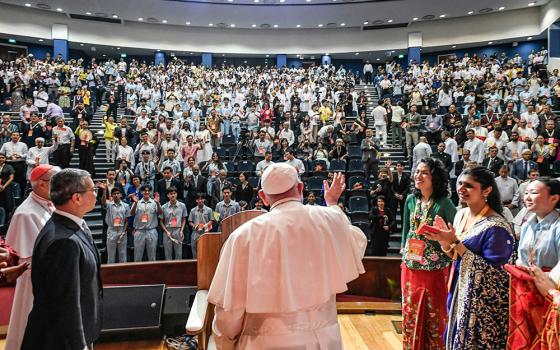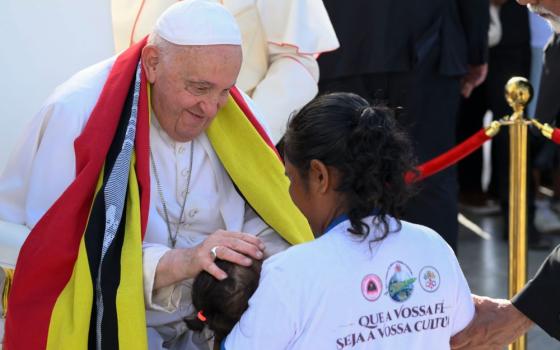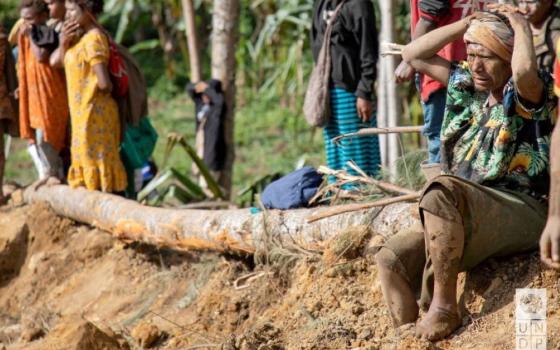Pope Francis attends an official welcome ceremony with President Joko Widodo of Indonesia outside Merdeka Palace in Jakarta, Indonesia, on Sept. 4. (CNS/Lola Gomez)
Pope Francis on Sept. 4 delivered a sharp warning that "distortion of religion" fuels extremism, intolerance and violence and urged Indonesia to double down on its long tradition of coexistence and social harmony during the first full day of his nearly two-week tour of Asia and Oceania.
"Prejudices can be eliminated and a climate of mutual respect and trust can grow," said the pope during his first address in the world's most populous Muslim-majority country. "This is indispensable for meeting common challenges, including that of countering extremism and intolerance, which through the distortion of religion attempt to impose their views by using deception and violence."
With a population of nearly 280 million — about 87% of whom are Muslims — the country's constitution guarantees freedom of religion and there is a longstanding government commitment to pluralism and diversity. But an uptick in religious restrictions as of late and the recent victory of President-elect Prabowo Subianto, who has a well-documented history of human rights abuses, has heightened concerns.
The pope used his remarks at Indonesia's presidential palace, in the presence of current President Joko Widodo, to remind Indonesia — a country made up of thousands of tiny islands — that their diverse society represents a "magnificent mosaic" that can offer an example of social harmony, rather than division.
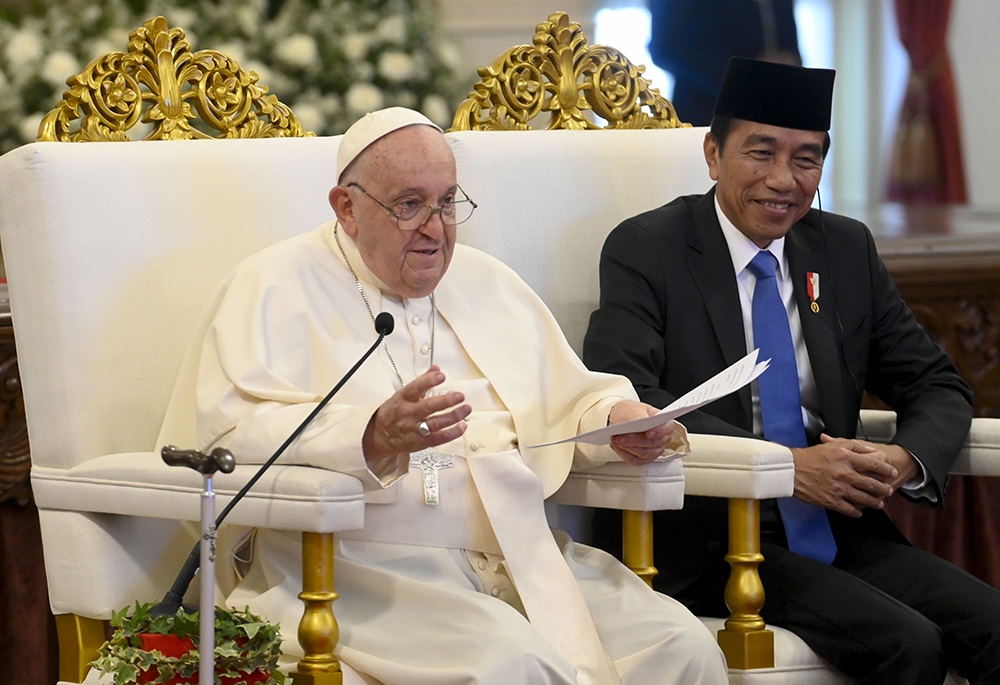
Pope Francis delivers his speech to President Joko Widodo of Indonesia and government and political leaders, diplomats and representatives of civil society during a meeting at Istana Negara, a national palace in Jakarta, Indonesia, on Sept. 4. (CNS/Vatican Media)
"A harmony in diversity is achieved when particular perspectives take into account the needs common to all and when each ethnic group and religious denomination acts in a spirit of fraternity, pursuing the noble goal of serving the good of all," he told a crowd of some 300 government leaders and diplomats.
"The awareness of participating in a shared history, in which solidarity is essential and contributions are made by all, helps to identify the right solutions, to avoid the exasperation of contrasts and to transform opposition into effective cooperation," the pontiff continued.
The 87-year-old Francis, who is making the longest trip of his pontificate, arrived in the country on Sept. 3 and after a brief welcome ceremony spent yesterday resting at the residence of the Vatican's ambassador to Indonesia.
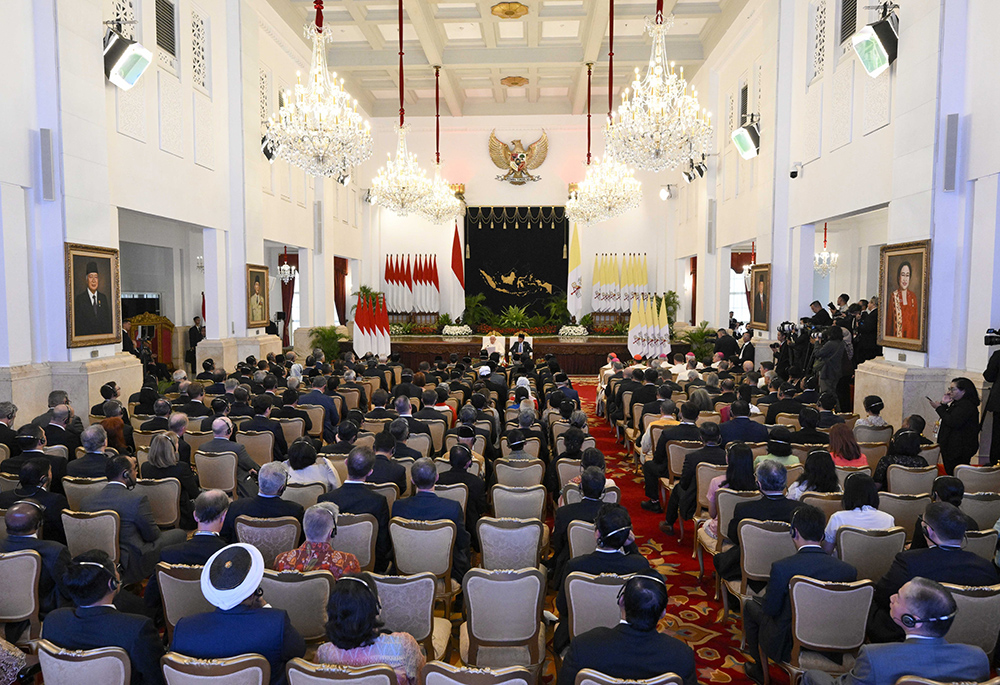
Pope Francis delivers his speech to President Joko Widodo of Indonesia and government and political leaders, diplomats and representatives of civil society during a meeting at Istana Negara, a national palace in Jakarta, Indonesia, on Sept. 4. (CNS/Vatican Media)
But at the presidential palace on Sept. 4, the pontiff received a grand welcome that brought traffic here in one of the busiest cities in Asia to a grinding halt.
Dozens of school children in local dress enthusiastically waved at the pontiff and shouted "Welcome to Indonesia!" as his car made its way through the presidential compound. And while Francis may be here to preach a message of peace, military cannons boomed as a band played the Holy See's national anthem, prompting hundreds of white pigeons to abandon their perches in the nearby trees and swirl above the palace and a neighboring mosque.
After taking in this spectacle, the pope and the president met privately before both delivering their official remarks, where both leaders reiterated the need for tolerance and peace.
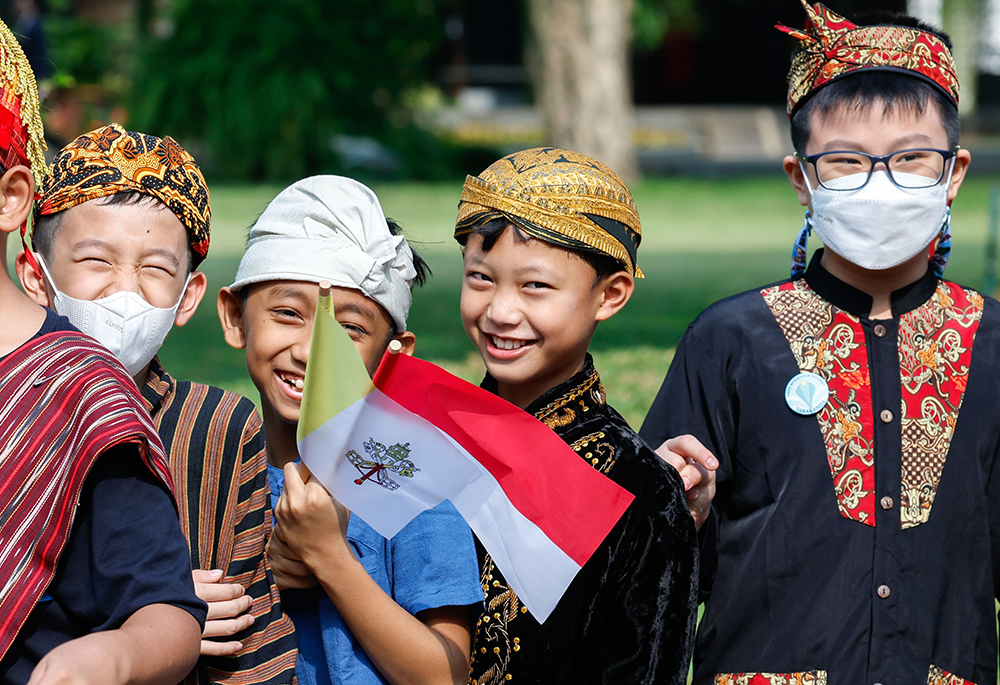
A group of children smile as they wait for Pope Francis to attend an official welcome ceremony outside Merdeka Palace in Jakarta, Indonesia, on Sept. 4. (CNS/Lola Gomez)
While the pope praised Indonesia's constitution for its commitment to these values, he also said the government must match its "impressive declarations of policy" with a greater focus on social justice.
Indonesia is now one of the world's fastest growing economies, yet there are still stark divides between the rich and poor.
"A considerable part of humanity is left on the margins, without the means for a dignified existence and no defense against the serious and growing social imbalances that trigger acute conflicts," the pope said.
Here in a city where towering skyscrapers are being rapidly built next to shantytowns, the pope returned to that same theme when he met in the afternoon at the city's cathedral with the country's Catholic bishops, priests, seminarians and consecrated women and men, and where he encouraged them to embrace compassion over self-interest.
"What keeps the world going is not the calculations of self-interest, which generally end up destroying creation and dividing communities, but offering charity to others," he said. "It makes us see things better, in the light of love."
Caring, the pope added, "is not communism."
Advertisement
Through a witness of charity and fraternity — not by imposition or proselytism — the church will best model the example of Christ, said the pontiff, who was frequently animated as he spoke off the cuff and energetically engaged Indonesia's Catholic community.
"Proclaiming the Gospel does not mean imposing our faith, proselytizing or placing it in opposition to that of others, but giving and sharing the joy of encountering Christ, always with great respect and fraternal affection for everyone," Francis told the crowd, imploring them to to be "prophets of communion, in a world where the tendency to divide, impose and provoke each other seems to be constantly increasing."
Outside of the cathedral, hundreds of onlookers — Muslim and Catholic alike — stood in front of Jakarta's Istiqlal Mosque, hoping to get a glimpse of the pope.
In a strange harmony, their cheers were joined by both the sounds of the call to prayer coming from the mosque and wooden wind chimes being played outside the cathedral — helping to illustrate one of the pope's major themes from his ambitious journey that there is room for a wide range of diversity on this multifaceted continent.





